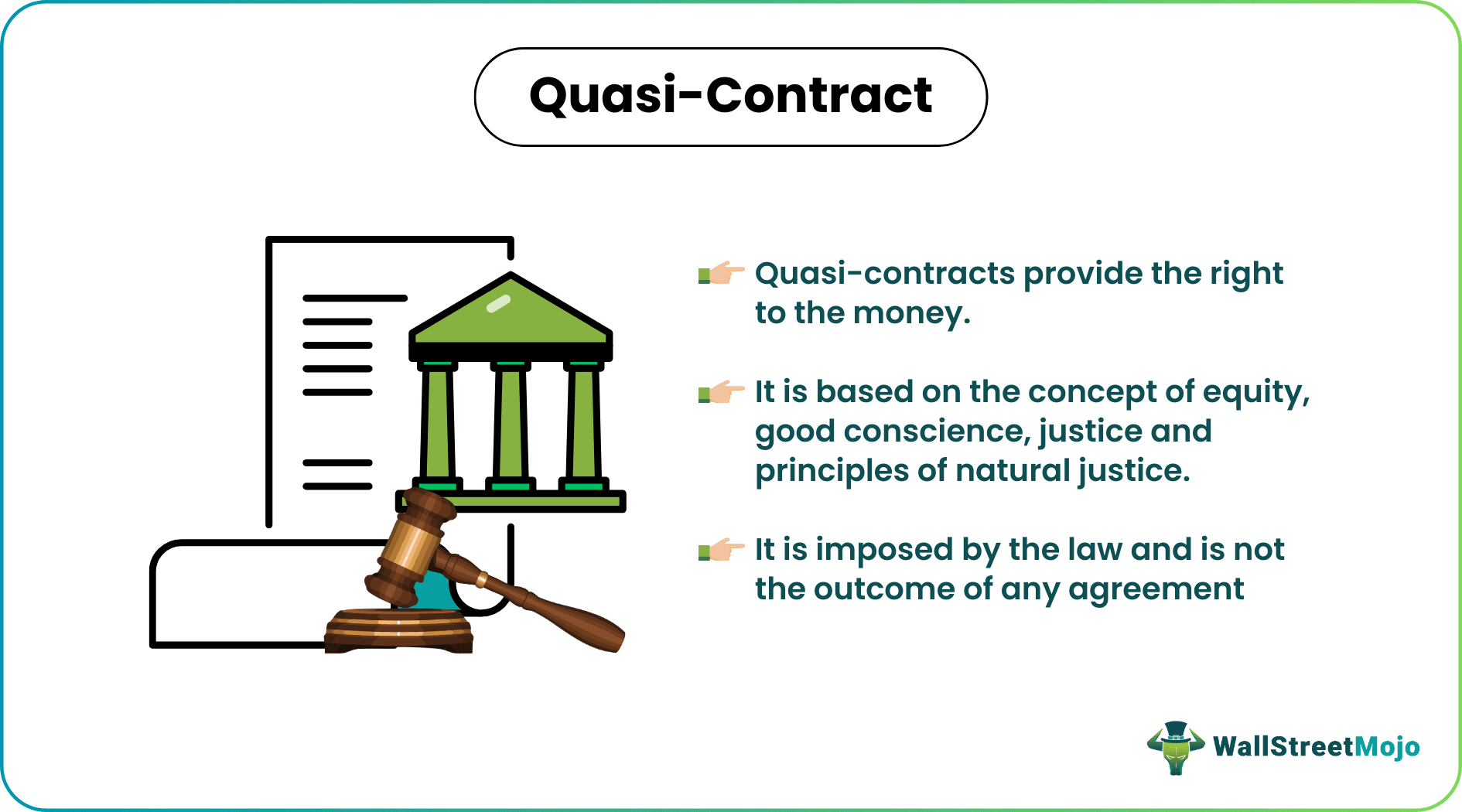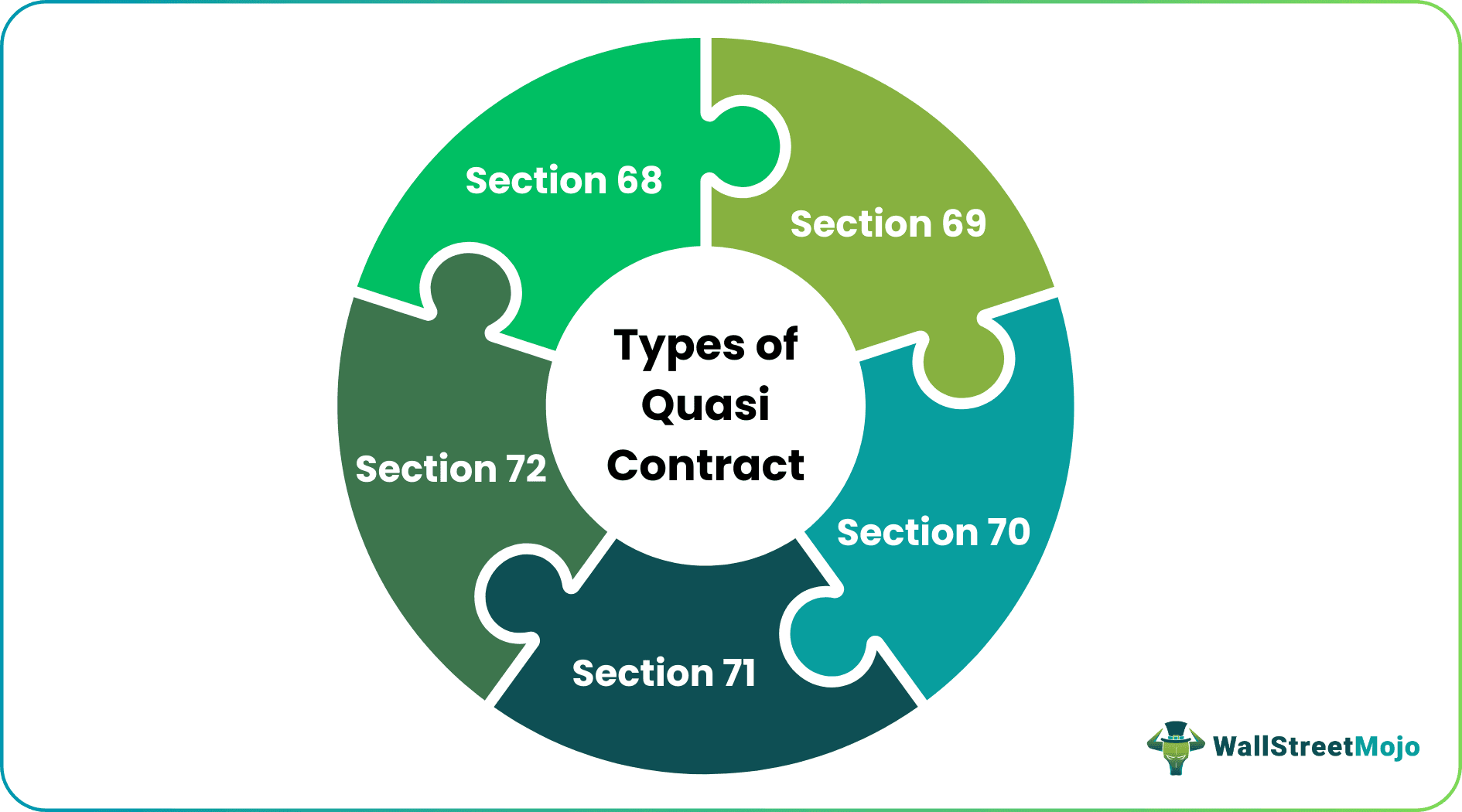Table Of Contents
Quasi-Contract Meaning
A quasi-contract refers to the obligation of the contract created out of order by the court not to let one party get unfair benefit out of the situation at the expense of other parties where there is the absence of initial agreement among the parties and there is a dispute between them.

Key Takeaways
- A quasi-contract refers to a legal obligation created by the court to prevent one party from unjustly benefiting at the expense of another party, even without an initial agreement between them and a dispute between the parties.
- The different types of quasi-contracts recognized in legal systems include Section 68, Section 69, Section 70, Section 71, and Section 72.
- Quasi-contracts are based on principles of justice, equity, and sound conscience.
- They aim to ensure fairness and prevent one party from taking advantage of another party's efforts or resources without appropriate compensation or restitution.
Explanation
A quasi-contract is an agreement imposed by the law, which outlines the obligation of one party towards another party if the former possesses the property of the latter party, i.e., something is acquired by one party at the expense of another party. The court creates these to avoid unjust enrichment of any party's overpayment against a good or service. Since the court makes these, neither party can disagree with it and must follow it.

Examples of Quasi-Contract
- A person orders some perishable items online by providing his address and paying for the same. At the time of the delivery of the goods, the delivery man delivers them to the wrong address. Instead of denying the delivery, the receiving party accepts the order and consumes the same.
- The case went to the court, and the court then ordered to issue a quasi-contract according to which the recipient has to pay back the cost of the item to the party who paid for the item initially. So, in this case, the benefits of the goods have been enjoyed by the receiving party, so such a receiving party is bound to compensate the former party.
Features
The features are as follows:
- Usually, the quasi-contracts provide the right to the money.
- There is an absence of the contract or mutual consent among the parties; thus, it is imposed by the law and is not the outcome of any agreement.
- They are based on equity, a good conscience, justice, and principles of natural justice.
Requirements of Quasi-Contract
There are certain types of the requirement that are required for a judge to fulfill for making a ruling for the quasi-contract, as discussed below: -
- The plaintiff must have provided service or tangible goods to the defendant, and the plaintiff had the impression that he would receive payment for such goods or services.
- Also, the plaintiff should justify that the defendant would be unjustly enriched if he received goods or services without their payment.
Types of Quasi-Contract
The types are laid down under sections 68 to 72, which are mentioned below: -

#1 - Section 68
It states that a person is not capable of entering into any contract. Therefore, the supplies are provided to him or anyone the incapable person is legally bound to support by the third party. The supplier third party is entitled to recover such supplier's price from the unable person’s property.
#2 - Section 69
It states that if a person is interested in paying money and pays on behalf of another person, he is bound to pay by the law. So then, the person who made the payment is entitled to reimbursement by another party (on behalf of whom he has paid).
#3 - Section 70
It states that the receiving party has enjoyed the same benefits if a person does anything for the other person lawfully or delivers something without intending to do the same gratuitously. Then, such a receiving party is bound to compensate the former party.
#4 - Section 71
It states that if a person finds goods that belong to another party and takes such goods into his custody, then the former has responsibility the same as that of a bailee.
#5 - Section 72
It states that if a person has been paid or delivered mistakenly or under coercion, he must repay or return.
Difference Between Quasi-Contract and Contract
The contracts are the expressed ones approved by the parties under consideration as a matter of law where they share interests and consequences though specifically described conditions. In contrast, under quasi-contracts, the obligations are enforced by the law based on the parties' conduct to prevent the undue advantage of one party over the cost of another party.
Advantages
The advantages are as follows:
- It prevents the undue advantage of one party over the cost of other parties as it is based on the unjust enrichment principle.
- It is created by order of the court, so none of the parties involved can disagree with such orders. So, all the parties involved are obliged to follow it.
Disadvantages
The Disadvantages are as follows:
- The enriched party will not be held liable in the cases where the benefit he received was tendered negligently, unnecessarily, and by the miscount.
- It is generally created only to the extent necessary to prevent unjust enrichment. The plaintiff must forgo all the expected profit he would have earned if there is a whole expressed agreement between the parties involved.
Conclusion
There are situations when there is no contract between the parties. Still, even then, certain social relationships create specific obligations that some parties must perform by order of the court. These obligations are known as quasi-contracts since the same obligations are created as that would have been made in the case of the regular contract. These quasi-contracts are created based on justice, equity, and good conscience principles.
